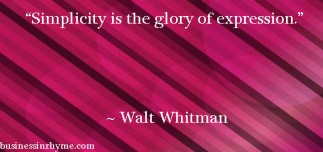This is a guest post, a courtesy of a fellow blogger and poet Jason J. Michael. This essay is a bit longer than usual posts on this blog, but I encourage you to read it through – a touching story on how poetry, particularly haiku has changed his life, literally.
The Healing Power of Haiku
4641
Believe in yourself,
And your ability to
Make a difference.On September 3, 2000, when I was twenty-nine, my father died. He smoked himself to death acquiring, in order, blocked arteries, throat cancer, lung cancer, emphysema, and finally congestive heart failure, which in combination with the others claimed his life. His untimely death was fully expected by everyone around him, except for me. A jazz musician, he had quietly sold off his instruments to friends, had delusions of teaching sax quartets in our kitchen, gone to the drugstore in his briefs, and had visions of a mute, glowing boy and girl that accompanied him on errands. All of these I was aware of. None of them I took that seriously. I was living home with my parents temporarily, but consumed by my career goals. I was directing, acting, and composing for a local dinner theatre, I loved the job and it held my full focus. Besides, parents are immortal, right?
I was with him in the hospital, holding his hand, when he passed. In fact, I had been the one to give permission to take him off the machines that were keeping his heart and lungs operational when my mother, in an unexpected wave of grief, refused the honor and responsibility herself, stating “I just can’t do it.” The decision by default fell to me and, sensing no recourse, I ordered him removed from the machines and held his hand till his heartbeat faded. From my point of view, I had just killed my father.
The following year was a blur of work juxtaposed against a backdrop of depression and excessive sleep. One year to the day, on the anniversary of his death, September 3, 2001, I started working as a full-time music teacher at a Catholic boys’ school in Philadelphia. It was exactly the kind of job he would’ve wanted for me, and I felt pushed into it by his overshadowing presence. Everyone there was wonderful, but the pain of his loss coupled with the guilt I had felt over “pulling the plug” was consuming me, and combined with the isolation I felt from having moved away from my family for work, I sank further into depression and almost nightly contemplated suicide.
Then one night in late fall of 2001, while sitting alone in my apartment, I started flipping through channels and stopped on a bald man with a calming presence, wry wit, and warm, gravelly, voice. His name was Dr. Wayne Dyer, the PBS special was There’s a Spiritual Solution to Every Problem, and I found myself drawn to what he was saying. Dyer’s pithy, anecdotal, personal empowerment spirituality resonated and stuck with me long after the special ended, and by the next evening I was reading his book, The Power of intention. Within a few days signature quotes such as “You’ve got to believe it to see it” and “You are a spiritual being having a human experience” started to take up permanent residence in my brain and I was feeling a bit better. One quote, “Don’t die with your music still in you,” held special significance for me.
My degree had been in Music Composition, and my father and I had spent many hours composing together in our basement. When he died the music in my head had gone silent as if it died with him, but I knew instinctively, defiantly, that that wasn’t the case. In my grief I couldn’t access it; my guilt over “killing” him, and my need for his approval had turned my creative volume setting to mute. But I knew it was there, knew that Dr. Dyer’s warning mantra was applicable to my life, and knew that I would have to start slowly if I was to ever rekindle the creative flame inside myself. As a musician I had often been both composer and lyricist. I prided myself on my ability to put words cleverly together. But I would have to start again slowly, with small projects that allowed for a big sense of accomplishment. So, on November 18, a few weeks after watching the special, I sat at a desk over lunch in the center of a crowded school hallway – a reluctant and bored hall monitor – and wrote my first haiku in twenty years.
1
If I ruled the world…
But wait! Life is perception.
Where did I go wrong?I struggled to write four haiku that day, but the next day I wrote more, and more after that. By January 20, 2002 I had written a hundred little poems, and realized I was starting to feel a bit better. I still wasn’t composing, but my creative juices were flowing, and I was amassing a large body of poetry that I could be proud of.
At the time I didn’t realize the full impact that writing haiku was having on my life, or how much I had almost obsessively fallen in love with distilling my daily thoughts down to a 5-7-5 syllabic format. I didn’t realize fully the therapeutic benefit, that by putting my thoughts simply and creatively on paper and “out there” I was releasing the pent up depression, guilt, and grief that had built up inside me over the last year and a half. I just knew I was being creative and felt better, and when something makes you feel good you keep doing it, don’t you?
Sixteen years after my father’s death, practically no week has gone by that I haven’t written at least one haiku. As of this writing, I’ve composed over 4,600 of the little buggers, self-published two books of poetry, plus a third children’s book. My music took years to return to me, but when it finally did it blew in with a vengeance, and I now compose fairly regularly, along with trying to maintain my blog, of course.
Everyone’s pathway to healing is unique, and for all I know had circumstances been different, perhaps something else would have come along to intervene, lift me up, and rehabilitate my spirit. Then again, perhaps nothing would have changed, and in my grief I may have commit suicide. But thankfully, THANKFULLY, that wasn’t to be my fate, and I ran across Dr. Dyer and his life philosophy when my spirit needed him the most. And that led me to fight for my life, a little bit at a time, with seventeen syllables in a crowded hallway, and with props to Frost, “that has made all the difference” for me. So, in case you ever had any doubts that poetry has magical properties or lasting value, I’m here to tell you that I’m living proof that poetry can change or even save a life. And that is the true healing power of haiku.
Namaste,
Jason
Jason J. Michael is a freelance actor, director, music director, and composer. He has self-published two books of poetry, True Haiku for You and A Haiku a Day; and one children’s book, Daddy Doesn’t Purr (But I Love Him Anyway), all available on Amazon. He won the Writer’s Journal National Poetry Contest with his poem “The Greatest Treasure” many years ago and has written some 4,600 haiku to date. He lives in King George, VA with his wife, son, and three cats. His blog, Reflections from Shangri-La, can be found at https://reflectionsfromshangrila.wordpress.com/
If you would like to contribute with your guest post visit this link for further information. And, if you are interested in getting more inspiration for your creativity,sign up for our free monthly newsletter.



